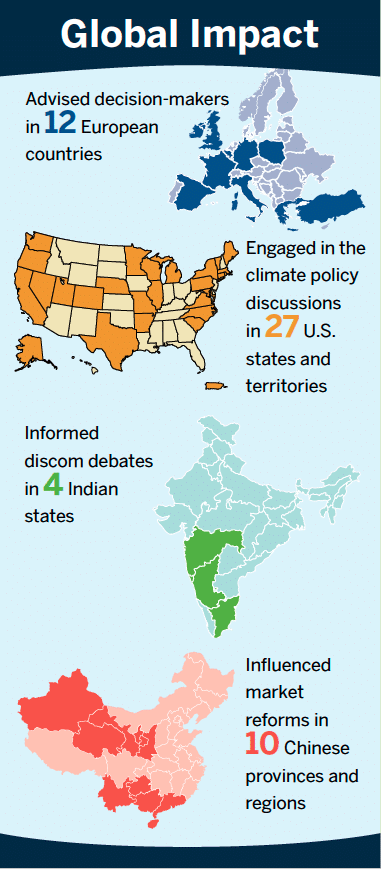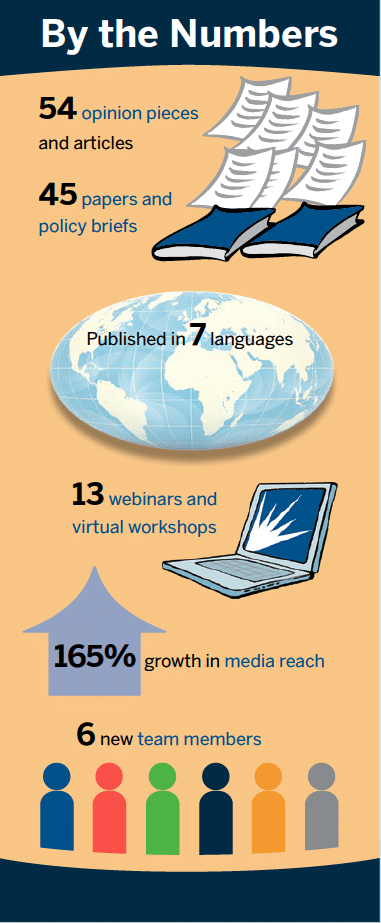As we stepped into the new year, my colleagues and I took time to reflect on the influence of our collective work at RAP in 2021. I share the following sample of our global impact in hopes that it inspires new ideas or opportunities to engage. Don’t hesitate to reach out to me or one of my colleagues if something sparks your interest!

RAP’s thought leadership drives progressive policy decisions
In 2021, decision-makers around the world adopted policies consistent with RAP’s thought leadership. We’re excited to see uptake of effective policies that meet the urgency of the moment and advance an equitable and efficient energy transition.
China’s powerful National Development and Reform Commission announced a mandatory time-of-use electricity pricing policy for nearly all retail customers. The policy is a major step forward for engaging citizens in the energy transition, integrating renewables into the grid and advancing innovations like flexible charging of electric vehicles. It will put China at the forefront of this effort internationally.
The European Commission’s “Fit for 55” legislative package lays a solid foundation for implementing the Green Deal climate goals. Key policies include a near doubling of Member States’ energy efficiency obligations, exclusion of fossil-fueled appliances from counting toward those energy savings, strong equity provisions to direct energy savings programs to people experiencing energy poverty, and faster rollout of smart charging for electric vehicles.
The UK’s Heat and Buildings strategy is a roadmap that calls for phasing out fossil fuel heat systems by 2035, reforming energy tariffs to make heat pumps more cost competitive, and funding to accelerate heat pump uptake. RAP was appointed to the Business, Energy and Industrial Strategy Committee, delivering expert testimony and briefing government officials, advocates, industry, and the media.
At least a dozen U.S. states have distribution system planning policies to encourage the use of clean distributed energy and build a more resilient, flexible grid. They are a crucial piece of the decarbonization puzzle, especially as building and transportation electrification takes off.
Debunking fossil fuel myths to shift the debate
RAP confronted the myths around the gas transition head on and equipped policymakers to challenge conventional wisdom. We made the case against the widespread use of hydrogen for heating in many different fora, including written analysis for Energy Monitor (the most read article since the launch of this outlet) and One Earth.
Our team published Under Pressure: Gas Utility Regulation for a Time of Transition, a toolkit with practical options for facilitating a smooth and fair transition off gas. We’re bringing together utility commissioners and staff from nine leading states for direct, behind-the-scenes conversations on navigating the challenging and sensitive issues of the gas transition. Through peer-to-peer engagements, decision-makers are finding the courage and tools to take action, even when confronted with misleading industry narratives.
We set the record straight on causes of the massive Texas outage—namely, the failure of natural gas generation and production and regulators’ inaction on prudent weatherization measures. Our article on the lessons learned established RAP as the source for accurate information on this consequential event. We published our analysis in Dutch, German, and Chinese – taking our messages on the need for more efficiency and demand flexibility global.
Electrifying buildings for equity and resilience
In partnership with the Global Buildings Performance Network, we launched a project to demonstrate how affordable housing developments can provide energy access and play a leading role in India’s energy transition. These grid-interactive, efficient buildings — housing for low- and middle-income families — will provide much needed demand flexibility to absorb high amounts of renewable energy and ensure vulnerable customers can participate fully in the energy transition.
Building a strong organizational foundation
In 2021, we made two commitments: to grow our organization to respond to the urgency of our mission and accelerating demand from government; and to increase diversity. We began an intentional update of the full range of our employee practices (values, hiring, advancement, and retention) to ensure they reflect RAP’s goals for justice, diversity, equity, and inclusion. We also crafted an engagement plan that centers storytelling to increase our impact.
For a downloadable and printable version of this summary, click here.

